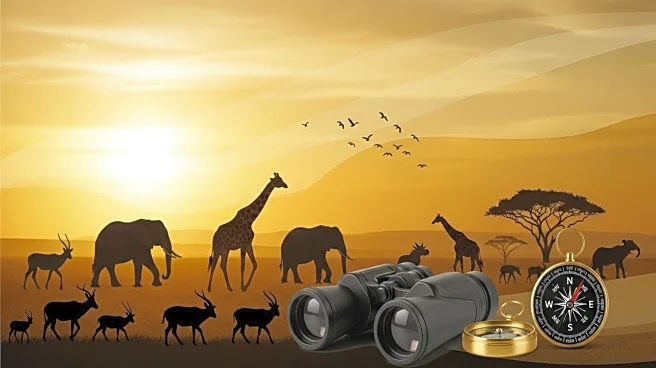What is the story about?
What's Happening?
Wildlife photographer Chris Fallows, known for his iconic 'Air Jaws' photograph, is spearheading a rewilding initiative in Africa. After witnessing the decline of great white sharks in False Bay, South Africa, Fallows shifted his focus to land conservation. In 2017, he purchased 25 hectares of land on South Africa's south coast, which he has transformed by removing invasive species and encouraging native flora and fauna. This effort has inspired neighboring landowners to join, expanding the conserved area to 1,500 hectares. Fallows plans to acquire a 10,000-hectare property in Namibia to create one of Africa's largest privately owned wildlife reserves, aiming to restore natural migration corridors for animals.
Why It's Important?
Fallows' rewilding project is significant for biodiversity conservation in Africa. By restoring native ecosystems, the initiative supports the revival of species such as cheetahs, black rhinos, and desert elephants. This effort not only enhances ecological health but also promotes sustainable land management practices. The project serves as a model for private conservation efforts, demonstrating how individuals can contribute to large-scale environmental restoration. The potential creation of extensive wildlife corridors could facilitate natural animal migrations, crucial for maintaining genetic diversity and ecosystem resilience.
What's Next?
Fallows plans to collaborate with local organizations and neighboring landowners to expand the conservation area further. The goal is to merge with other conservation landscapes, including Fish River Canyon, to establish a vast wildlife reserve. This initiative could lead to the reintroduction of charismatic wildlife species and the establishment of the world's largest black rhino sanctuary. The success of this project may inspire similar conservation efforts globally, emphasizing the importance of private land ownership in environmental preservation.
Beyond the Headlines
The rewilding initiative highlights the ethical responsibility of humans to restore and protect natural habitats. It underscores the potential for private individuals to drive significant environmental change, challenging traditional conservation models. The project also raises awareness about the impact of human activities on wildlife populations and the importance of sustainable practices. By prioritizing ecological restoration, Fallows' efforts contribute to the broader discourse on environmental ethics and the role of humans in shaping the future of the planet.

















